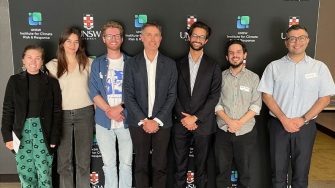At the end of the workshop, six researchers were awarded prizes for their research presentations, which included studies from climate science, policy, and communication. There were three categories for best presentations: from PhD students, PhD holders, and finally, a Lighting Talks round.
The Institute celebrates the winners' achievements listed below and extends its gratitude to all participants who submitted and presented their work. By supporting early career researchers in this way, the ICRR aims to encourage others to keep sharing their research, drive deeper understanding of climate challenges, and contribute to meaningful solutions for a more sustainable future.
1st Place for Best Presentation (PhD student): Matt Grant – Understanding Past Changes in Australian Droughts
Matt’s research quantified drought trends in Australia over the past century using multiple drought metrics, including precipitation, runoff, and soil moisture. He applied machine learning techniques to identify the key climate drivers behind these trends, aiming to deepen climate science's understanding of one of the country's most impactful extreme weather events.
Runner-up for Best Presentation (PhD Student): Arash Taheri – The Short-Run Impact of Wind and Solar on Prices and Conventional Plant Revenues: A Case Study of Australia's National Electricity Market
Arash’s study estimated the short-run relationship between wind and solar PV capacity and the revenues of coal and gas-fired plants in Australia’s National Electricity Market from 2020 to 2022. His findings suggested that a 1MW increase in wind (solar PV) capacity lowers the daily revenues for coal and gas plants by 0.05% (0.02%) and 0.17% (0.08%), respectively. However, the study also showed that generation cost-induced price increases warranted caution when extrapolating these trends into the medium and long term.
1st Place for Best Presentation (ECR): Nanak Narulla and Arjuna Dibley – Turning on Their Own: State Responses to Mounting Corporate Climate Change Litigation Risk
Nanak presented research co-authored with Dr Arjuna Dibley that examines the financial risks posed by climate litigation targeting corporations, which aims to hold them accountable for climate-related harms. Their research drew comparisons to large-scale lawsuits in industries such as tobacco and asbestos and explored how states might respond to the emerging corporate liability risks associated with climate change.
Runner-up Best Presentation (ECR): Dr Omid Ghasemi – The Trust Gap Between Climate Scientists and General Scientists Across 68 Countries
Omid’s study investigated global trust in scientists compared to climate scientists, using data from 69,534 participants across 68 countries. The research revealed that climate scientists tend to be trusted less than scientists in general, with political orientation – particularly right-wing ideology and conservatism – being significant predictors of lower trust in climate experts.


